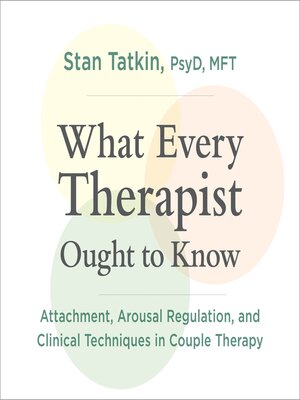What Every Therapist Ought to Know
audiobook (Unabridged) ∣ Attachment, Arousal Regulation, and Clinical Techniques in Couple Therapy
By Stan Tatkin, PsyD, MFT

Sign up to save your library
With an OverDrive account, you can save your favorite libraries for at-a-glance information about availability. Find out more about OverDrive accounts.
Find this title in Libby, the library reading app by OverDrive.



Search for a digital library with this title
Title found at these libraries:
| Loading... |
Expand and Enhance Your Skills as a Therapist with the Guidance of an Internationally Respected Clinician
Couple therapy combines the intense work of one-on-one sessions with the need for close mediation skills—which is why the practice can be twice as difficult and emotionally draining. This is why Stan Tatkin put together What Every Therapist Ought to Know—a comprehensive guide to the psychobiological approach to couple therapy.
Over the course of eight in-depth sessions, Tatkin will lead you in an exploration of the theory and clinical tools you need to work effectively with couples who are seeking more intimate, connected, and fulfilling relationships. Through both theoretical and experiential-based learning approaches, Stan will provide a foundational training in each of the primary attachment styles, as well as how knowledge of our own and our partners' attachment histories is essential for a healthy communication.
What Every Therapist Ought to Know will teach you:
• Anchors, Islands, and Waves: different attachment styles and how they affect relational thinking
• Specific interview techniques to soothe clients’ activation, encourage closer engagement, and elicit deeper insights
• How to guide couples out of disordered communication and into secure functioning
• Why monitoring and teaching arousal regulation during sessions yields future benefits
• How to refocus clients after disruptions in the process
• Why the psychobiological approach to therapy requires you to acknowledge when you’re wrong and investigate deeply how to change course
• How to self-inquire as a therapist and avoid jumping to premature conclusions
• The most common pitfalls in the couple therapy process and how to sidestep them
“Obviously, this is a career that is very different than most,” says Tatkin. “This process can be painful at times, but the struggle is an integral part of this very complex set of theories. It takes time and patience. If you do it a lot, you will eventually feel very comfortable in your practice.”






